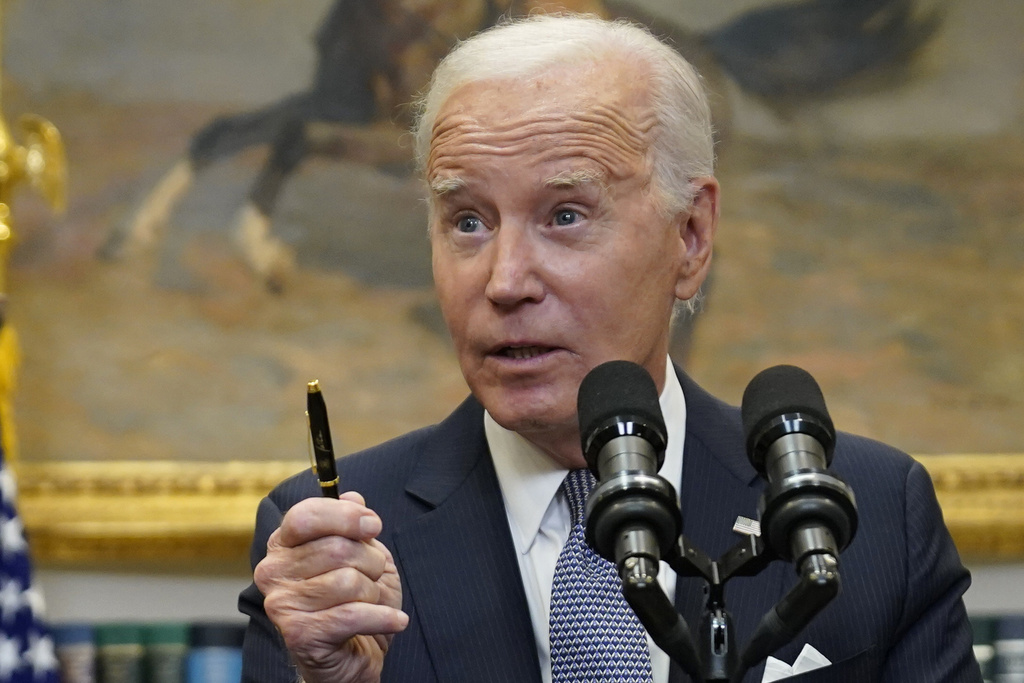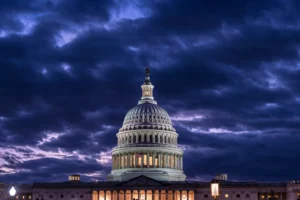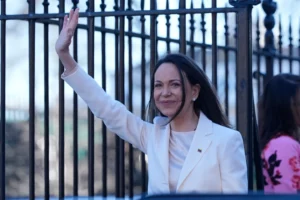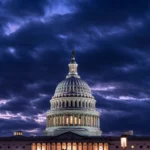Wyoming Leaders Celebrate Supreme Court Rulings on Loan Forgiveness, Affirmative Action
Congressional delegation praised the controversial decisions
- Published In: Politics
- Last Updated: Jul 01, 2023

The U.S. Supreme Court in recent days issued a series of controversial and consequential rulings impacting wide swaths of American society, many of which were celebrated by Wyoming's political leaders. (AP Photo/Mariam Zuhaib)
By Jacob Gardenswartz
Special to the Wyoming Truth
WASHINGTON — The U.S. Supreme Court on Friday concluded its 2022 term by issuing a series of consequential and controversial rulings, blocking President Joe Biden’s signature student loan forgiveness plan from taking effect and allowing businesses to refuse to provide creative services to LGBTQ customers.
The decisions came one day after the Court ended the widespread college admissions practice known as affirmative action, ruling the longstanding effort to boost racial diversity in higher education is unconstitutional. The decisions for all three topics broke on ideological lines, with the Court’s six conservative justices joining the majority and its three liberals opposing.
In Washington, Wyoming’s elected leaders celebrated. Sen. John Barrasso (R-Wyo.) said via statements and tweets that the cancellation of Biden’s loan forgiveness plan amounted to a “victory for every American who played by the rules,” and that the affirmative action ruling “ensures college admissions are centered on effort and merit.”
Sen. Cynthia Lummis (R-Wyo.) similarly said that she “applaud[s]” the Court for its decision striking down loan forgiveness, describing the policy as “morally wrong.” She praised the “landmark” decision ending affirmative action, too, claiming that there is “nothing more American than the idea that if you work hard, you should be rewarded regardless of your skin color.”
And Rep. Harriet Hageman (R-Wyo.) echoed her Senate colleagues, arguing Biden’s loan forgiveness policy “only passes along the cost of a degree to others that didn’t take out the loan,” and that affirmative action ruling would help preserve “equal opportunity for all.”

Notably, none of the officials would comment on the ruling allowing creative businesses to refuse to provide services to LGBTQ customers. Representatives for Barrasso, Lummis and Hageman did not respond to inquiries about that matter.
What are the cases about and what do they mean for Wyoming?
While the long-term implications of the Court’s decisions on Wyomingites are not yet known, they are expected to have significant impacts throughout American society.
Student Loan Forgiveness
In canceling Biden’s student loan forgiveness plan, the Court dealt a major blow to one of his signature policy proposals.
As a legal rationale for the debt cancellation — which was expected to impact some 43 million borrowers and cost the government nearly $400 billion, according to government estimates — Biden drew on statutory language allowing the president to “waive or modify” certain borrowing agreements during times of national emergency.
When then-President Donald Trump declared a state of emergency during the onset of the COVID-19 pandemic, he paused student loan repayment mandates and halted the accrual of interest. After Biden took office, he continued that pause, and last year announced plans to forgive up to $10,000 of student debt for individuals earning less than $125,000 per year and $20,000 for low-income families who received Pell grants.
Writing for the majority, Chief Justice John G. Roberts Jr. argued the Biden administration went too far. He invoked the so-called “major questions doctrine,” a recent invention of the Court’s conservatives which claims judicial bodies should strike down policies that raise “major questions” if Congress was not clear enough when authorizing them.
In her dissent, Justice Elana Kagen decried the legal mechanism as “made-up,” claiming it requires Congress “to delegate not just clearly but also microspecifically.”
Nearly 50,000 Wyomingites residents were eligible for some form of debt relief, per Department of Education estimates, including over 31,000 Pell grant recipients. On average, each state borrower holds roughly $31,250 in debt, according to the Education Data Initiative.
In remarks from the White House on Friday, Biden refused to concede defeat on the issue. He Instead, he said he’d pursue debt forgiveness by other legislative means, drawing on authority from a different law to eliminate or reduce large amounts of debt.
“This new path is legally sound,” Biden said. “It’s gonna take longer, but in my view it’s the best path that remains to providing as many borrowers as possible with debt relief.”
Affirmative Action
The affirmative action decision concerned cases brought against Harvard and the University of North Carolina. Roberts, again authoring the majority opinion, argued the universities’ admissions programs “cannot be reconciled with the guarantees of the Equal Protection Clause.” In Roberts’ view, such programs prioritized Black and Latino students over white and Asian applicants, thus violating the 14th Amendment to the Constitution.
Roberts added that “Nothing in this opinion should be construed as prohibiting universities from considering an applicant’s discussion of how race affected his or her life,” clarifying that an applicant’s race may be considered in admissions decisions so long as it is limited to his or her personal essay. Roberts also exempted military academies from the ruling, citing the “the potentially distinct interests” at play in maintaining a diverse force.
In a scathing critique, Justice Ketanji Brown Jackson called out that exemption, writing that the Court has reached a “bottom-line conclusion that racial diversity in higher education is only worth potentially preserving insofar as it might be needed to prepare Black Americans and other underrepresented minorities for success in the bunker, not the boardroom.”
Biden criticized the ruling in remarks from the White House on Thursday, arguing it “once again walked away from decades of precedent.” He noted that affirmative action policies only gave priority to non-white applicants who had already cleared the standards required to gain admittance to universities.

In Wyoming, the ruling is likely to have minimal impact. The University of Wyoming already claimed not to take race into account in application decisions, but the implications for students applying to colleges out-of-state remains to be seen.
Business Accommodations for LGBTQ Americans
The Court’s decision in 303 Creative LLC v. Elenis is perhaps its most far-reaching.
At issue was the question of whether an evangelical Christian web designer in Colorado could be required to work with same-sex couples despite her personal and religious beliefs against gay marriage. Though Colorado state law prevents business discrimination based on a number of factors, including sexual orientation, the Court ruled that forcing Lorie Smith to design websites for gay couples would run afoul of her First Amendment rights to free speech.
Though public accommodations laws such as Colorado’s are important, Gorsuch wrote for the majority, none are “immune from the demands of the Constitution.”
Justice Sonia Sotomayor in her dissent lambasted the decision as “heartbreaking.”
Of particular interest in this case was the fact that Smith had never refused nor even been hired to create a wedding website for a gay couple; she was suing purely to prevent some hypothetical possibility. Smith claimed she was previously contacted by a gay couple who inquired about potentially retaining her for design services in the future. But such a follow-up never came; new reporting this week indicated she may have never received the initial inquiry in the first place.
In a Friday statement, Biden said he’s “deeply concerned that the decision could invite more discrimination against LGBTQI+ Americans,” arguing it “weakens long-standing laws that protect all Americans against discrimination in public accommodations.” He called on Congress to enshrine such protections at the federal level.
Beyond Colorado, 28 states have laws on the books explicitly preventing discrimination LGBTQ people, though Friday’s ruling means creative businesses may likely avoid punishment should they do so.
Wyoming is among those states without such a law, and public attitudes towards LGBTQ protections remains mixed. Slightly over half of Wyomingites opposed allowing local business owners to refuse to serve gay or lesbian people if it violated their religious beliefs, a 2022 survey found, though such figures were lower than most other states.













